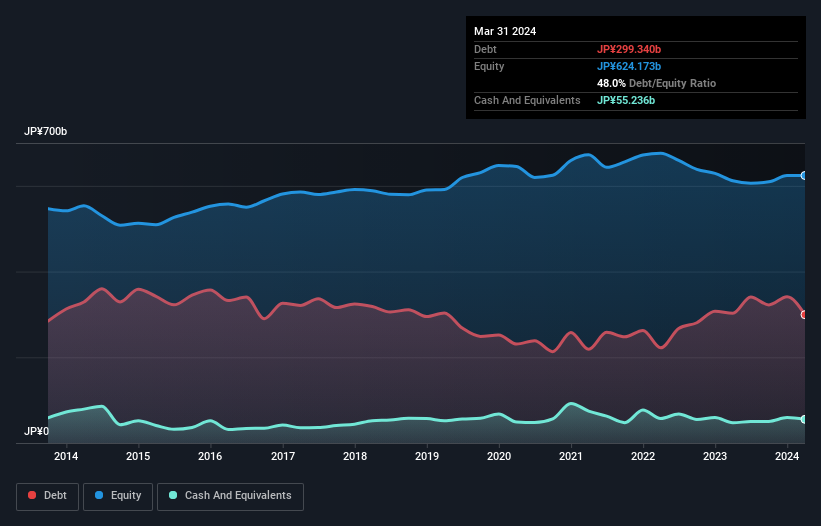
David Iben put it well when he said, 'Volatility is not a risk we care about. What we care about is avoiding the permanent loss of capital.' So it seems the smart money knows that debt - which is usually involved in bankruptcies - is a very important factor, when you assess how risky a company is. Importantly, Yamada Holdings Co., Ltd. (TSE:9831) does carry debt. But is this debt a concern to shareholders?
Why Does Debt Bring Risk?
Debt is a tool to help businesses grow, but if a business is incapable of paying off its lenders, then it exists at their mercy. Part and parcel of capitalism is the process of 'creative destruction' where failed businesses are mercilessly liquidated by their bankers. However, a more usual (but still expensive) situation is where a company must dilute shareholders at a cheap share price simply to get debt under control. Of course, plenty of companies use debt to fund growth, without any negative consequences. When we think about a company's use of debt, we first look at cash and debt together.
See our latest analysis for Yamada Holdings
How Much Debt Does Yamada Holdings Carry?
The chart below, which you can click on for greater detail, shows that Yamada Holdings had JP¥299.3b in debt in March 2024; about the same as the year before. However, it does have JP¥55.2b in cash offsetting this, leading to net debt of about JP¥244.1b.

How Strong Is Yamada Holdings' Balance Sheet?
We can see from the most recent balance sheet that Yamada Holdings had liabilities of JP¥461.6b falling due within a year, and liabilities of JP¥203.2b due beyond that. On the other hand, it had cash of JP¥55.2b and JP¥97.0b worth of receivables due within a year. So its liabilities outweigh the sum of its cash and (near-term) receivables by JP¥512.6b.
This deficit casts a shadow over the JP¥301.1b company, like a colossus towering over mere mortals. So we'd watch its balance sheet closely, without a doubt. After all, Yamada Holdings would likely require a major re-capitalisation if it had to pay its creditors today.
We use two main ratios to inform us about debt levels relative to earnings. The first is net debt divided by earnings before interest, tax, depreciation, and amortization (EBITDA), while the second is how many times its earnings before interest and tax (EBIT) covers its interest expense (or its interest cover, for short). Thus we consider debt relative to earnings both with and without depreciation and amortization expenses.
Yamada Holdings has a debt to EBITDA ratio of 3.6, which signals significant debt, but is still pretty reasonable for most types of business. However, its interest coverage of 37.4 is very high, suggesting that the interest expense on the debt is currently quite low. Sadly, Yamada Holdings's EBIT actually dropped 5.8% in the last year. If earnings continue on that decline then managing that debt will be difficult like delivering hot soup on a unicycle. When analysing debt levels, the balance sheet is the obvious place to start. But ultimately the future profitability of the business will decide if Yamada Holdings can strengthen its balance sheet over time. So if you're focused on the future you can check out this free report showing analyst profit forecasts.
Finally, a company can only pay off debt with cold hard cash, not accounting profits. So we always check how much of that EBIT is translated into free cash flow. In the last three years, Yamada Holdings's free cash flow amounted to 28% of its EBIT, less than we'd expect. That weak cash conversion makes it more difficult to handle indebtedness.
Our View
We'd go so far as to say Yamada Holdings's level of total liabilities was disappointing. But on the bright side, its interest cover is a good sign, and makes us more optimistic. Overall, it seems to us that Yamada Holdings's balance sheet is really quite a risk to the business. For this reason we're pretty cautious about the stock, and we think shareholders should keep a close eye on its liquidity. When analysing debt levels, the balance sheet is the obvious place to start. But ultimately, every company can contain risks that exist outside of the balance sheet. For example - Yamada Holdings has 1 warning sign we think you should be aware of.
Of course, if you're the type of investor who prefers buying stocks without the burden of debt, then don't hesitate to discover our exclusive list of net cash growth stocks, today.
New: Manage All Your Stock Portfolios in One Place
We've created the ultimate portfolio companion for stock investors, and it's free.
• Connect an unlimited number of Portfolios and see your total in one currency
• Be alerted to new Warning Signs or Risks via email or mobile
• Track the Fair Value of your stocks
Have feedback on this article? Concerned about the content? Get in touch with us directly. Alternatively, email editorial-team (at) simplywallst.com.
This article by Simply Wall St is general in nature. We provide commentary based on historical data and analyst forecasts only using an unbiased methodology and our articles are not intended to be financial advice. It does not constitute a recommendation to buy or sell any stock, and does not take account of your objectives, or your financial situation. We aim to bring you long-term focused analysis driven by fundamental data. Note that our analysis may not factor in the latest price-sensitive company announcements or qualitative material. Simply Wall St has no position in any stocks mentioned.
Have feedback on this article? Concerned about the content? Get in touch with us directly. Alternatively, email editorial-team@simplywallst.com
About TSE:9831
Yamada Holdings
Operates in the consumer electronics retailing activities in Japan and internationally.
Undervalued with mediocre balance sheet.
Similar Companies
Market Insights
Community Narratives


